Search Results
Showing results 241 to 260 of 580
Magnus Glider
Source Institutions
A design challenge that takes paper airplanes into an entirely different direction: a magnus glider uses cups and and rubber bands to create a glider that uses the same forces that a curveball (from b

Coral Snapshots: Biodiversity in Marine Protected Areas
Source Institutions
In this data activity, learners analyze data from coral reef snapshots taken by scientists at the Virginia Institute of Marine Science.

Paper Cup Stool
Source Institutions
In this activity, learners will explore how and why weight distribution works.
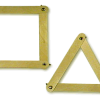
Strong Shapes
Source Institutions
Is a square stronger than a triangle? Use tongue depressors to build simple shapes. Then apply a little weight to them and see what happens!
Size Them Up: Learning About Volume and Capacity
Source Institutions
In this activity, learners will put a set of containers in order by capacity. Would the tallest container hold more or less water than the wide, short one?
Fair Shares: Predict Equal Shares
Source Institutions
Use this activity to build division and number sense into any snack time or whenever there is a limited set of things to share among a group: If we deal these out, could everyone get two pieces?
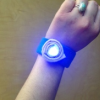
High Tech Fashion
Source Institutions
In this technology activity, learners build simple circuits, design soft circuits using conductive thread, and then sew switch-activated circuits.

Get In The Game
Source Institutions
In this design challenge, learners will use computational thinking to design their own board game.

Sound Representation: Modems Unplugged
Source Institutions
In this activity, learners listen to songs and decode hidden messages based on the same principle as a modem. As a final challenge, learners decode the binary messages in a music video.
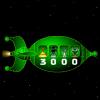
Slush Rush
Source Institutions
In this online game, learners run an outer space drink stand and thirsty alien customers are on the way.

Locating a Point
Source Institutions
In this activity, learners work in teams to simulate the process used by Global Positioning Systems (GPS) to determine the location of a fallen meteorite in Antarctica.

Move That Lighthouse!
Source Institutions
In this activity, learners explore how engineers work in a team to solve problems.
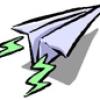
Nosedive
Source Institutions
This is a great activity for investigating the basics of lift and drag as they pertain to flight. Learners will discover how to avoid "taking a nosedive" by building their own paper airplane.

Rescue Rover
Source Institutions
In this activity, learners explore how rescue devices are designed to aid professionals during emergency situations.
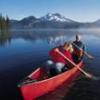
Can You Canoe?
Source Institutions
In this activity, learners explore how engineering has impacted the manufacturing of canoes over time, including the development of new, durable, and lighter materials.

The Best Dam Simulation Ever
Source Institutions
This online simulation game explores the different consequences of water levels on the Columbia River in the Pacific Northwest.
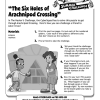
Six Holes of Arachnipod Crossing
Source Institutions
In this Cyberchase activity, learners use the numbers one through six to solve a puzzle.
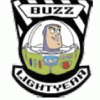
Buzz Lightyear Connect It!: Flight Path Activity
Source Institutions
In this activity, "space cadets" (learners) use writing and sequencing skills in addition to directional words/ordered pairs to guide Buzz Lightyear (from the movie "Toy Story") through a grid to reac

Globe at Night
Source Institutions
In this international citizen science activity, learners measure their night sky brightness and submit their observations into an online database.

EEEEK--A Mouse!
Source Institutions
In this activity, learners explore the concept of how engineering solved the problem of human/computer interface.
